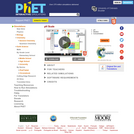
Undergraduate Learning Assistants can be used to supplement the instructor and/or Teaching Assistant during recitations. They may help facilitate productive group work on tutorial activities designed to help students develop conceptual understanding and problem-solving skills. In this example, we describe the use of Learning Assistants to support tutorials within recitation in two introductory science courses physics and chemistry.
- Subject:
- Arts and Humanities
- Chemistry
- Physical Science
- Physics
- Material Type:
- Activity/Lab
- Teaching/Learning Strategy
- Provider:
- Science Education Resource Center (SERC) at Carleton College
- Provider Set:
- Starting Point (SERC)
- Author:
- Laurie Langdon
- Noah Finkelstein
- Stephanie Chasteen
- Steven Pollock
- Date Added:
- 08/28/2012

